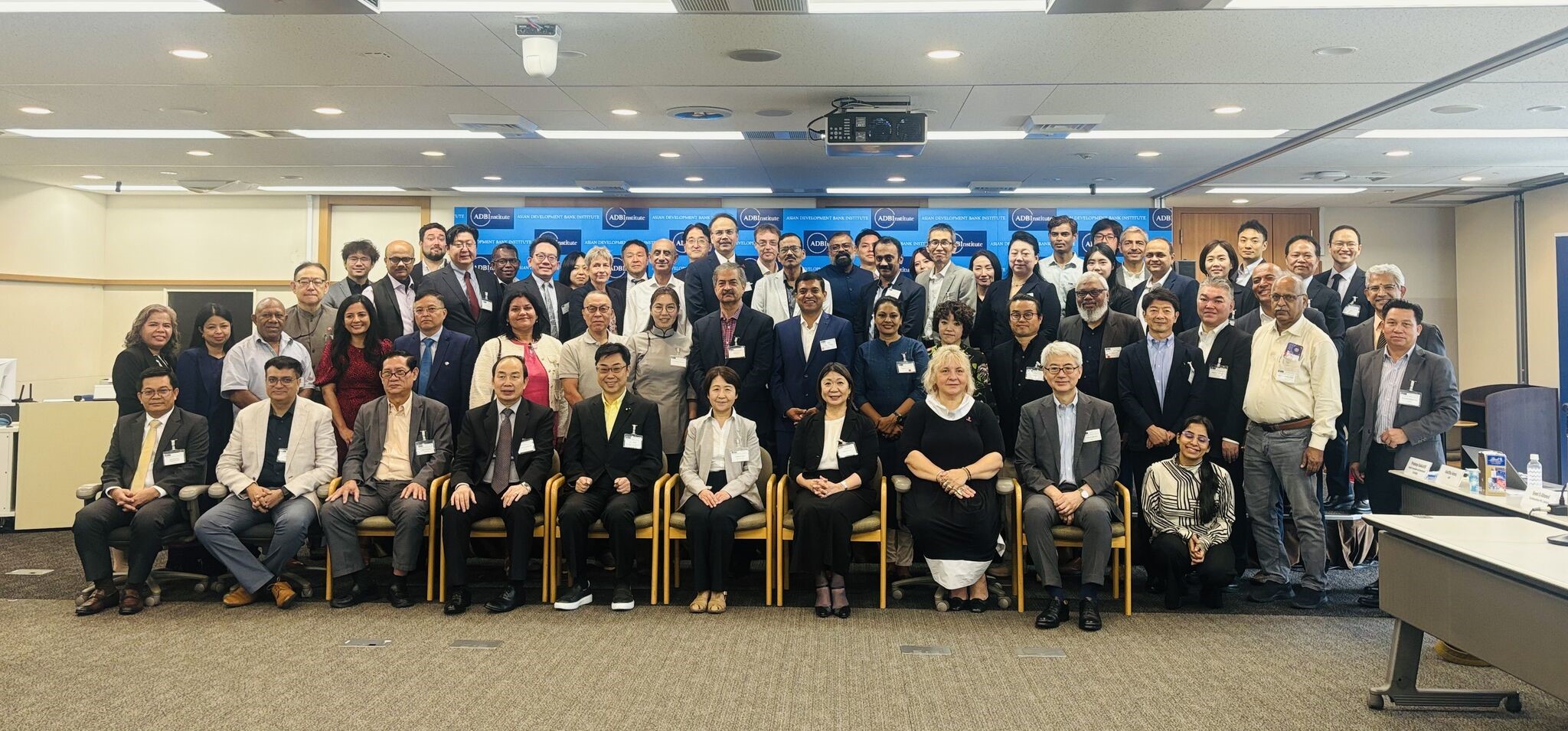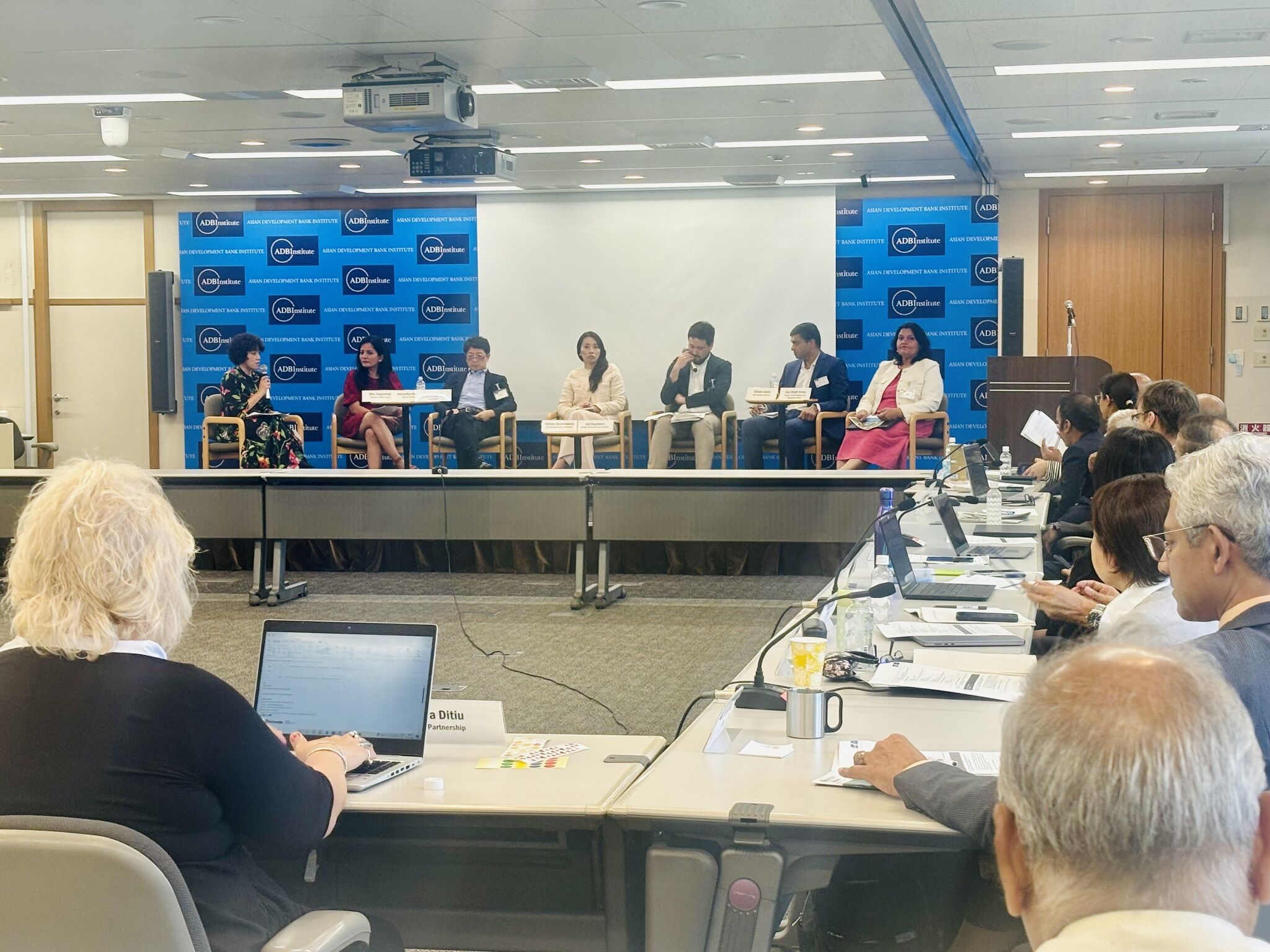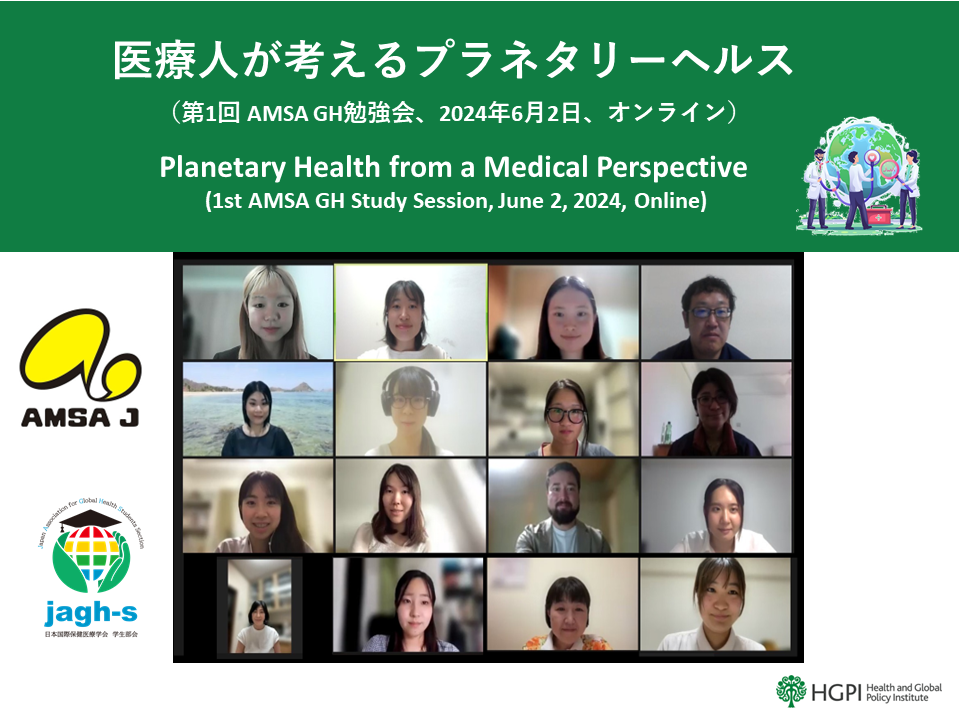[Lecture Report] “Innovations in Climate Change and Infectious Disease Response ” (ADB-ADBI Policy Dialogue, July 17, 2024, Tokyo)
date : 7/29/2024
Tags: Planetary Health
![[Lecture Report] “Innovations in Climate Change and Infectious Disease Response ” (ADB-ADBI Policy Dialogue, July 17, 2024, Tokyo)](https://hgpi.org/en/wp-content/uploads/sites/2/lecture-media-282-top.jpg)
Mr. Joji Sugawara, Vice President of Health and Global Policy Institute (HGPI), participated in a panel discussion titled “Strengthening Health Systems and Financing for Infectious Diseases” at the policy dialogue “Investing in Climate Change Adaptation: Innovation in Climate-Induced Infectious Diseases Control for Malaria and Tuberculosis ” hosted by the Asian Development Bank (ADB) and the Asian Development Bank Institute (ADBI) on July 17, 2024.
The event focused on the impacts of climate change on health, particularly the spread of infectious diseases such as tuberculosis and malaria. It also aimed to introduce innovative technologies and data analysis tools to address these challenges. The event saw collaboration from partners such as Nagasaki University, the Global Fund, Malaria No More Japan, and the Stop TB Partnership. Experts in health and climate change, along with government officials from countries like the Philippines, India, and the Solomon Islands, gathered to discuss these critical issues.

During the policy dialogue, discussions covered how climate change affects the spread of infectious diseases like tuberculosis and malaria, and the economic, social, and health system impacts. The latest advancements in tuberculosis diagnosis technologies and the associated challenges and solutions were explored. The current state and challenges of malaria spread, detection methods, and treatment approaches were also discussed. Additionally, the role of innovative technologies and data analysis tools in addressing health issues arising from climate change was emphasized.
 his panel discussion, Mr. Sugawara highlighted that infectious diseases, including tuberculosis and malaria, are influenced by climate change through changes in host behavior. He also pointed out the need for healthcare systems to adapt to the changing medical demands caused by climate change. In the Asia-Pacific region, rapid aging and the need to address non-communicable diseases alongside climate change require transformative efforts, which may not be easy. However, he stressed that tackling climate change concurrently opens up new approaches and partnerships, potentially leading to breakthroughs beyond traditional healthcare funding.
his panel discussion, Mr. Sugawara highlighted that infectious diseases, including tuberculosis and malaria, are influenced by climate change through changes in host behavior. He also pointed out the need for healthcare systems to adapt to the changing medical demands caused by climate change. In the Asia-Pacific region, rapid aging and the need to address non-communicable diseases alongside climate change require transformative efforts, which may not be easy. However, he stressed that tackling climate change concurrently opens up new approaches and partnerships, potentially leading to breakthroughs beyond traditional healthcare funding.
Based on the outcomes of the policy dialogue, ADB and ADBI plan to develop policy recommendations on the impacts of climate change on infectious diseases and an innovation playbook for tuberculosis and malaria responses leveraging technological advancements. HGPI remains committed to addressing the challenges of climate change and health through continued efforts and innovations.
For more information, please click here.
Top Research & Recommendations Posts
- [Research Report] Building a Mental Health Program for Children and Measuring its Effectiveness (June 16, 2022)
- [Research Report] 2019 Survey on Healthcare in Japan
- [Announcement] A Turning Point Towards Building Green Healthcare Systems (June 5, 2024)
- [Policy Recommendations] Developing a National Health and Climate Strategy for Japan (June 26, 2024)
- [Research Report] The 2023 Public Opinion Survey on Satisfaction in Healthcare in Japan and Healthcare Applications of Generative AI (January 11, 2024)
- [Policy Recommendations] Obesity Control Promotion Project 2023 “The Next Steps for Engaging and Cooperating with Patients, Citizens, and Communities for Implements of Obesity Control Measurements” (April 8, 2024)
- [New Report] Policy Priorities for Super-Ageing Japan: Health Innovation and Economic Growth in the COVID-19 Pandemic Era (February 24, 2021)
- [Policy Recommendations] Kidney Disease Control Promotion Project 2023 “Establishing Kidney Disease Control Measures with Patient, Citizen, and Community Engagement and Collaboration” Policy Recommendations, a Collection of Good Practices of Chronic Kidney Disease (CKD) and Control Measures in Local Governments (February 14, 2024)
- [Report and Recommendations] Discussion Points in Healthcare DX Project Expert Panel Meeting (April 2, 2024)
- [Policy Recommendations] Achieving Equity in Multidisciplinary Pain Treatment and Support Systems for Pain Management (March 31, 2023)
Featured Posts
-
2024-10-07
[Registration Open] Planetary Health Expert Meeting “Building the Future of Healthcare: A Vision for Sustainable and Resilient Health Systems with GGHH” (November 5, 2024)
![[Registration Open] Planetary Health Expert Meeting “Building the Future of Healthcare: A Vision for Sustainable and Resilient Health Systems with GGHH” (November 5, 2024)](https://hgpi.org/en/wp-content/uploads/sites/2/ph-20241105-topr2.jpg)
-
2024-10-28
[Registration Open] (Hybrid Format) Public Symposium “Promoting CVD Control Based on the Needs of People Living with or Affected by Cardiovascular Diseases: Towards Effective Implementation of the Second Phase CVD Control Plans” (November 22, 2024)
![[Registration Open] (Hybrid Format) Public Symposium “Promoting CVD Control Based on the Needs of People Living with or Affected by Cardiovascular Diseases: Towards Effective Implementation of the Second Phase CVD Control Plans” (November 22, 2024)](https://hgpi.org/en/wp-content/uploads/sites/2/cvd-ncd-20241122-top.png)
-
2024-10-30
[Event Report] Advisory Board Meeting for Meaningful Involvement Promotion Project “Promoting People with Lived Experience Participation in Policy-Making: Building a Social Foundation for Proactive Engagement” (September 11, 2024)
![[Event Report] Advisory Board Meeting for Meaningful Involvement Promotion Project “Promoting People with Lived Experience Participation in Policy-Making: Building a Social Foundation for Proactive Engagement” (September 11, 2024)](https://hgpi.org/en/wp-content/uploads/sites/2/mip_20240911.jpg)
-
2024-10-31
[HGPI Policy Column] (No.49) From the Mental Health Project ”Changes in the Japanese Mental Health Policy and Future Policy Topics” (The 2nd part ”Issues surrounding long-term hospitalization and future policy topics”)
![[HGPI Policy Column] (No.49) From the Mental Health Project ”Changes in the Japanese Mental Health Policy and Future Policy Topics” (The 2nd part ”Issues surrounding long-term hospitalization and future policy topics”)](https://hgpi.org/en/wp-content/uploads/sites/2/column-49-top.png)
-
2024-11-01
[Registration Open] Designing for Dementia Briefing Session 2024 – Conversations on the Trajectory of Our Activities and Envisioning the Future (December 3, 2024)
![[Registration Open] Designing for Dementia Briefing Session 2024 – Conversations on the Trajectory of Our Activities and Envisioning the Future (December 3, 2024)](https://hgpi.org/en/wp-content/uploads/sites/2/dementia-20241203-top.png)








